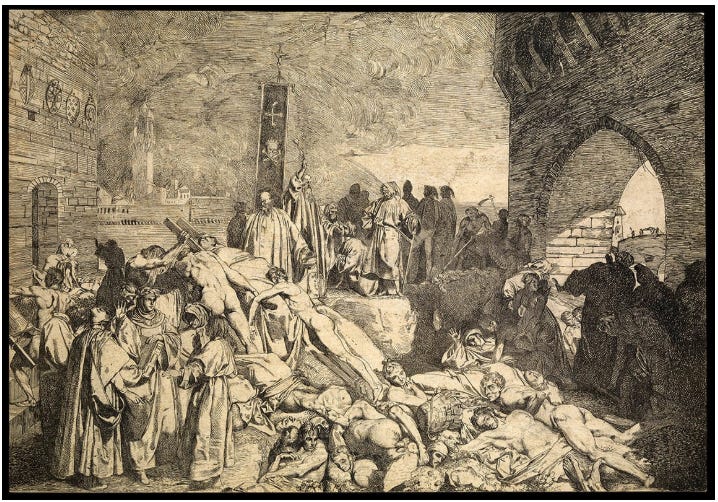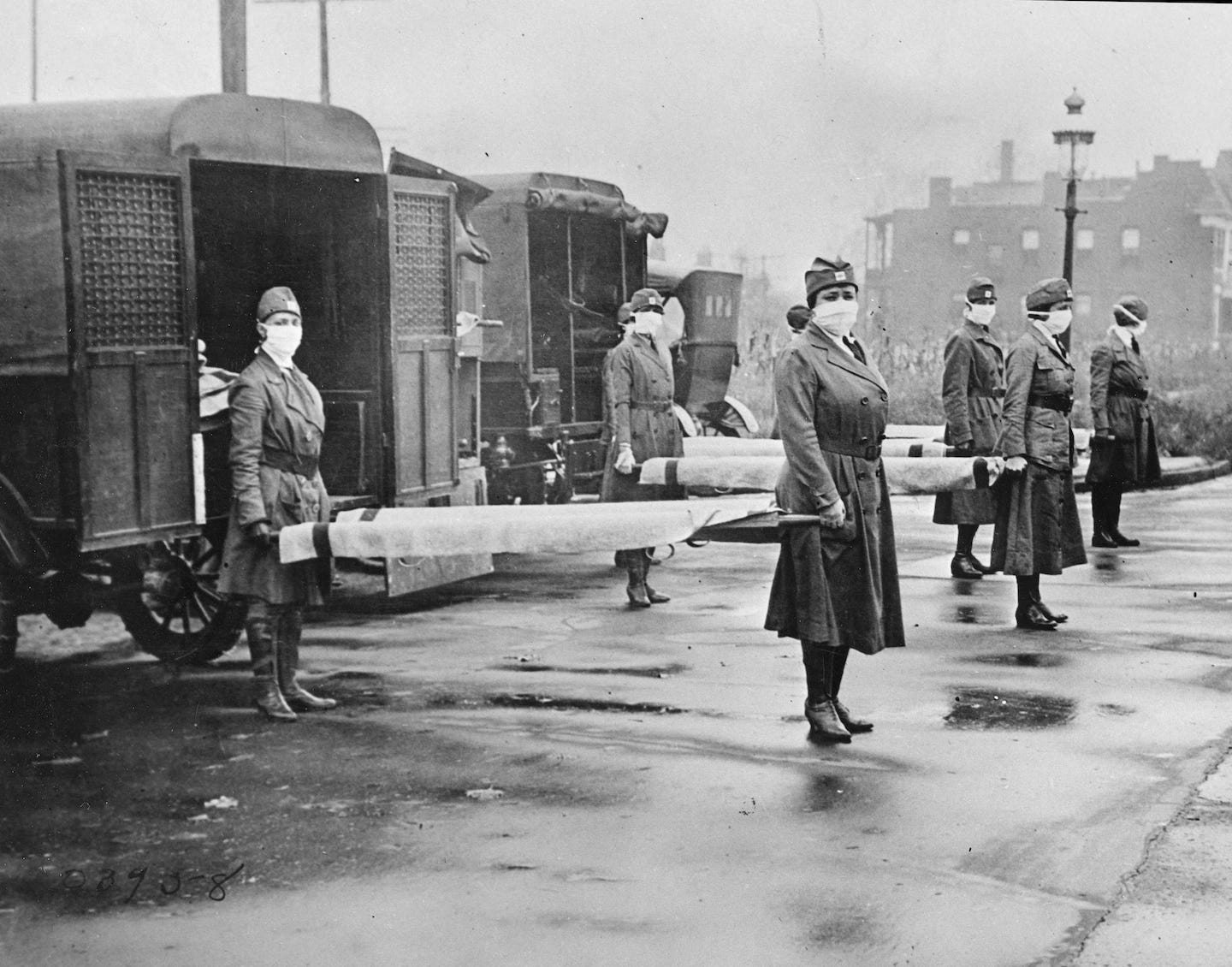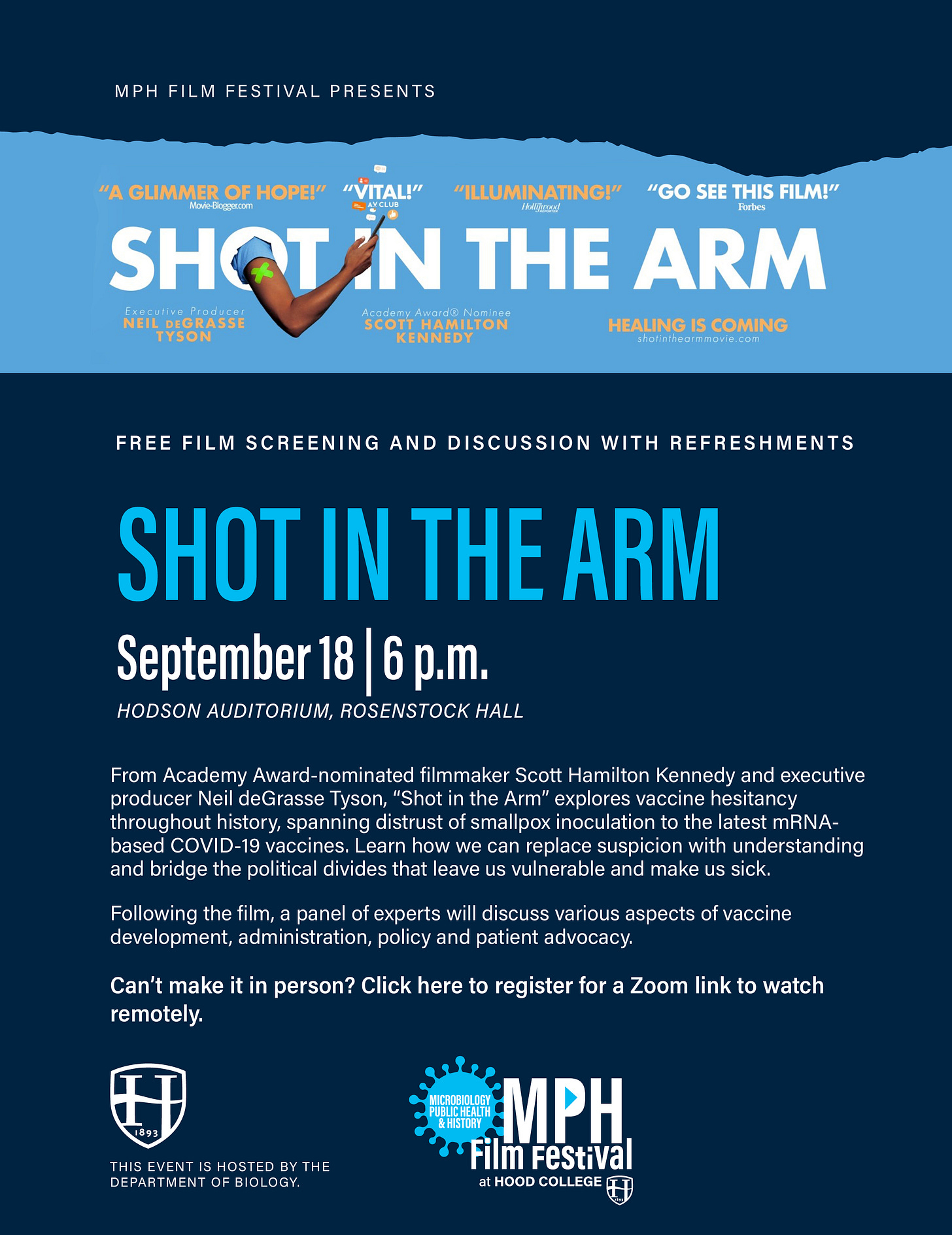Join Me: Watch Shot in the Arm and Talk Vaccine and Public Health History
Ignoring history kills people. Now, it's not just being repeated—it's being weaponized by anti-science profiteers with government authority.
This newsletter is free, but consider supporting a biomedical scientist trying to combat the war on health by upgrading to a paid subscription:
When I was an undergrad, I took a class that combined several of my passions [okay, obsessions] — infectious diseases, public health, and history. If you trace human history, you quickly see a pattern: disease outbreaks don’t just cause illness, they upend societies. Epidemics disrupt daily life, force cultural shifts, and (ideally) push us toward deeper knowledge and understanding.
Unfortunately, too many of us don’t know, or don’t care, about these seismic events that shaped science, culture, and public health. Because of that, we doom ourselves to repeat history — with catastrophic consequences. Anyone else feel like Sisyphus these days?
The Black Death (1340s–1350s): The plague, caused by Yersinia pestis and spread by flea-infested rodents, killed up to 50% of Europe’s population. Lower-income “peasants” bore the brunt, since rodents were more common in poorer quarters of cities.
Nearly everyone has probably heard of the Black Death, by most people don’t realize it accelerated distrust in the Church. Clergy insisted that prayer and religious rituals would halt the spread of disease and death and when that failed spectacularly, people started to question religious authority. That skepticism helped pave the way for the Renaissance and Reformation: if the Church was wrong about something so deadly, why follow blindly?

The 1918 Influenza Pandemic: This strain of H1N1 influenza infected an estimated 500 million people worldwide and killed at least 50 million — a mortality rate of 10%. This was more deaths than in World War I (1914-1918) itself, which society was still reeling from, and killed many young adults, a pattern generally atypical of flu.
Without vaccines, rudimentary health systems and governments were overwhelmed trying to control the spread of illness and death, but also panic within communities. This catastrophe illustrated to the world how unprepared people were for global outbreaks. It led to the expansion of the US Public Health Service and the development of disease surveillance efforts, which ultimately laid the groundwork for the creation of the WHO (World Health Organization) in 1948.
It helped influence modern disease epidemiology and normalized public health measures, like mask wearing, as part of civic responsibility. Unfortunately, that history lesson we have clearly forgotten.

When we ignore public health history, we pay for it with our lives.
Every time science delivers an infectious disease breakthrough—from smallpox inoculations in the 1700s, polio vaccines in the 1950s, mRNA COVID-19 shots just five years ago—the same tired disinformation script unfolds.
Fear. Conspiracy. Lies. Profiteering.
Us scientists could practically write the talking points for anti-science activists before they open their mouths, because it’s all been recycled for centuries:
It’s poison.
It’s a government plot to control you.
It’ll corrupt your bloodline.
It’ll change your DNA.
Different century, same nonsense. But it isn’t just nonsense—it’s dangerous. These false narratives work their way into the public discourse, erode trust, and undermine collective responsibility. It’s why we are so concerned when vaccine rates decline or people refuse to participate in public health interventions. Those metrics tell us people are believing the anti-science disinformation—and that means, we as a population, are vulnerable to preventable to disease outbreaks.
History is filled with these examples, far more than just the two I listed above. Communities that refused smallpox inoculation were ravaged while their neighbors were spared. Parents who bought into anti-vaccine campaigns in the 1990s and 2000s helped measles resurge in places where it had been nearly eliminated (if you didn’t read my last newsletter, it discusses exactly this):
But this isn’t in the past. We are seeing this happen in real time. Faster, and more aggressively, because anti-science profiteers like RFK Jr, Marty Makary, Jay Bhattacharya, Mehmet Oz and their allies (Mark Hyman, EWG, Zen Honeycutt, Calley and Casey Means) have control and authority within our federal government and health systems.
Disinformation causes preventable deaths. Always has. Always will. But now, these lies aren’t just circulating on your uncle’s Facebook page—they’re being turned into policy. Into laws. Conspiracy theories are now being legitimized by people in power—the same people who are supposed to be protecting our communities.
Not only are they ignoring history, they are throwing it into the dumpster and consciously committing to make things a hell of a lot worse for all of us. It is unconscionable.
That’s why I’m happy to support my fellow colleagues efforts on the same. Mark Chee, a professor at Hood College, created the Microbiology & Public Health History (MPH) Film Festival years ago to try to galvanize enthusiasm for this very thing. His project uses film to illustrate how infectious diseases have shaped society, culture, and science.
This season is focused on how pseudoscience is harming public health. The goal? Raising the alarm that history isn’t trivia, it’s a warning. And it should be a lesson we have already learned.
Now, with our elected officials failing us (the Senate is the one who confirmed these people, fyi) and media outlets contributing to the misinformation landscape, we have to work together. Scientists, healthcare providers, and the public: we all must speak up loudly and often, so we can try to repair some of the damage already done, and try to prevent an even worse epidemic in the future.
Mark will be screening Shot in the Arm next week at Hood College as part of that mission. Directed by Scott Hamilton Kennedy and executive produced by Neil deGrasse Tyson, it explores the throughline from smallpox to COVID, exposing how the disinformation machine undermines forward progress in public health.
Even if you’re not a student at Hood, you can join the free screening.
After the film, I’ll be joining other experts for a panel discussion about vaccines, policy, and how we can push back on the misinformation machine.
If you’re free next Thursday evening and want to watch the film and ask scientists and public health experts your burning questions, come join us. Register to join virtually by Zoom here: https://tinyurl.com/mph-film-fest
This isn’t just about vaccines—it’s about combating disinformation before it becomes bad policy that erodes science and harms our health.
That’s true whether we are talking vaccines, food ingredients, agriculture science, or more.
Hope you’ll join us next week, and in the fight for science and health.
Now, more than ever, we all must join in the fight for science.
Thank you for supporting evidence-based science communication. With outbreaks of preventable diseases, refusal of evidence-based medical interventions, propagation of pseudoscience by prominent public “personalities”, it’s needed now more than ever.
More science education, less disinformation.
- Andrea
ImmunoLogic is written by Dr. Andrea Love, PhD - immunologist and microbiologist. She works full-time in life sciences biotech and has had a lifelong passion for closing the science literacy gap and combating pseudoscience and health misinformation as far back as her childhood. This newsletter and her science communication on her social media pages are born from that passion. Follow on Instagram, Threads, Twitter, and Facebook, or support the newsletter by subscribing below:





Great article, Dr. Love! I agree with you, the influence of the Church when it comes to health (and other topics) has been so dangerous to society. It's no surprise the Black Death contributed to the growth of the Renaissance and helped change the way people view religion and authority. Too bad many people had to die to realize that. Today we know medical science works and we must fight to protect it and promote it, like you inspire us to do. And it's great you are promoting "Shot in the arm", a great documentary worth watching. Scott's other documentary, "Food evolution" is also excellently done, very eye-opening. Thank you for everything you do, Dr. Love!